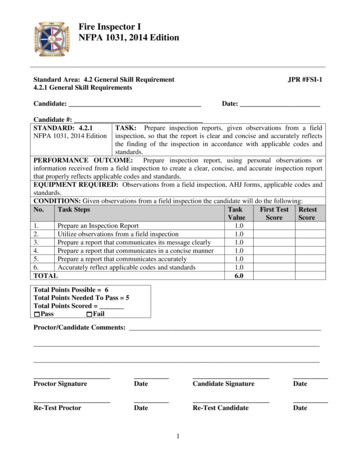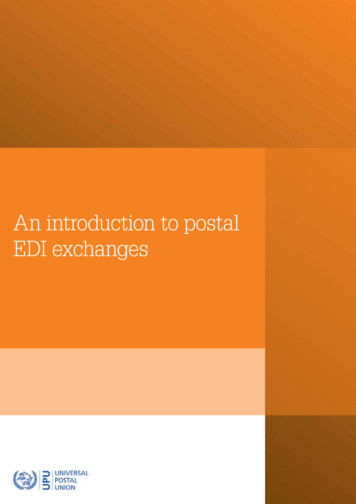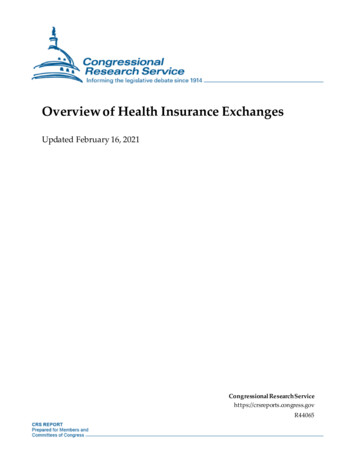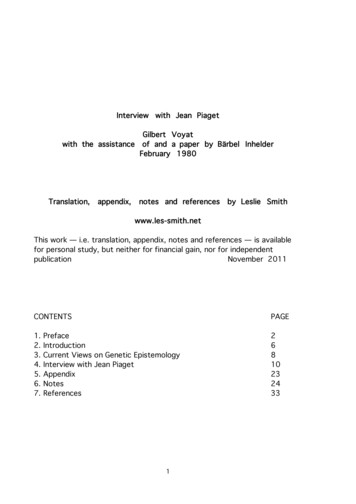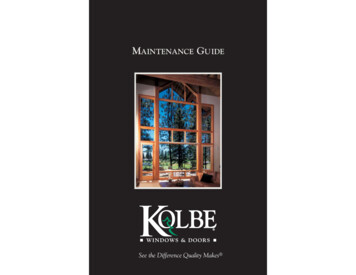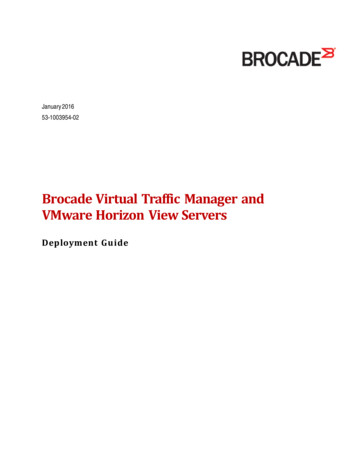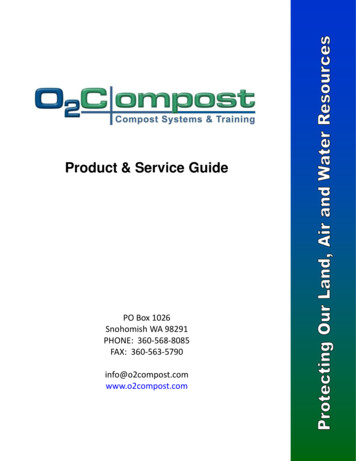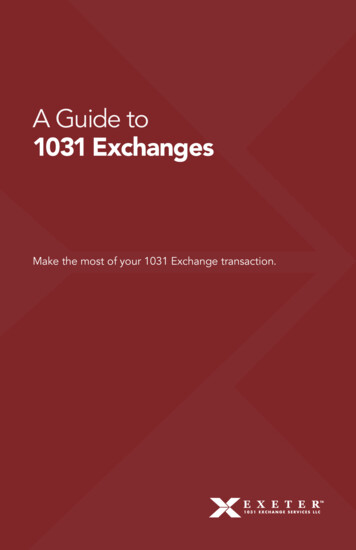
Transcription
A Guide to1031 ExchangesMake the most of your 1031 Exchange transaction. Copyright 2014 by Exeter 1031 Exchange Services, LLC. All rights reserved. Revised October 2014. www.exeterco.comi
Welcome from Bill ExeterPresident and Chief Executive OfficerThe fact that you are reading this tells me youare serious about finding ways to help you betterprotect and build your hard-earned money.Deferring taxes on the sale of investment realestate or other assets is one such strategy. If youare exploring this option, then A Guide to 1031Exchanges is written for you.It is designed to be both comprehensive andeasy to understand. We’ve received enormouspositive response to this guidebook for years.We continue to update and reprint it. Whether you are new to 1031Exchanges, or a seasoned investor or their professional advisor, it is ago-to resource for technical topics ranging from simple to complex.If you don’t find exactly what you are looking for, please contact us.We are always available to assist you: Available 24/7 Accessible by phone, email, or website: (619) 239-3091 or (866) 393-8370 ask@exeterco.com www.exeterco.com –click on the Call Exeter 24/7 linkShould you decide to proceed with a 1031 Exchange, we would behonored to assist you. We offer this performance guarantee: If for anyreason you are not completely satisfied with our service, we will refundyour set-up fee, no questions asked.We trust you will find this guidebook helpful and informative.Very truly yours,William L. ExeterPresident and Chief Executive Officer Copyright 2014 by Exeter 1031 Exchange Services, LLC. All rights reserved. Revised October 2014. www.exeterco.com1
TABLE OF CONTENTSExeter 1031 Exchange Services, LLC3Tax Deferral and Tax Exclusion Strategies41031 Exchange (Investment Property)4Three Property Identification Rule181033 Exchange (Involuntary Conversion)6200% FMV Identification Rule181034 Exchange (Repealed)695% Identification Exception19121 Exclusion (Primary Residence)6Completing Your 1031 Exchange19453 Installment Sale(Seller Carry-Back Note)6721 Exchange (upREIT or 1031/721)180 Calendar Day 1031 Exchange PeriodIdentification Requirements1618Deferring 100% of Your Income Taxes196Permissible and Non-PermissibleSelling Expenses201031 Exchange Benefits7Partial Tax Deferral211031 Exchange Structures7Forward 1031 Exchanges7Exchanging Multiple Propertiesand Fractional Interests217Seller Carry-Back Financing218Assignment of the Purchaseand Sale Agreement21Simultaneous 1031 ExchangesDelayed 1031 ExchangesReverse 1031 Exchanges8Early Release of Funds before Closing21Taxpaying Entity22Entity Breakup Issues22Related Party Issues22Choosing a Reliable Qualified Intermediary 10Access to Your 1031 Exchange Funds24Safeguarding Your 1031 Exchange Funds12Financial Strength, Bonding and Stability12Cooperation Clauses for Purchaseand Sale Contracts24Licensed by State of California12Step-By-Step Instructions toComplete 1031 Exchange25Qualified Trust Account12Special Tax Planning Strategies27Improvement (Build-To-Suit) 1031 Exchanges 91031 Exchange AdministrationThe Role of the Qualified Intermediary(Accommodator)Qualifying Use PropertyProperty Must Be Held For Investment991212Intent to Hold for Investment Use is Critical 13Like-Kind and Non-Like-Kind PropertyLike-Kind Property14Non-Like-Kind Property14Vacation Properties and Second Homes15Personal Property (Non-Real Estate)15Domestic or Foreign Property151031 Exchange Deadlines45 Calendar Day Identification Period2131616Combining a 1031 Exchange witha 121 Exclusion27Rental Property Converted to a PrimaryResidence (Prorated Exclusion Applies)27Rental Property Acquired via a 1031 Exchangeand Converted to a Primary Residence(Prorated Exclusion Applies)27Primary Residence Converted to aRental Property (Exclusion Not Prorated)28Combined 121 Exclusion and 1031 Exchangeon Split-Use Property28Installment Sale Treatment for Failed 1031Exchanges Copyright 2014 by Exeter 1031 Exchange Services, LLC. All rights reserved. Revised October 2014. www.exeterco.com29
Exeter 1031 Exchange Services, LLC1031 Exchange Qualified Intermediary or AccommodatorWhat We OfferExeter 1031 Exchange Services, LLC serves as the QualifiedIntermediary (“Accommodator”) for Forward, Reverse, and Improvement1031 Exchange strategies for real estate and personal property (nonreal estate) transactions. Exeter Reverse 1031 Exchange Services, LLCserves as the Exchange Accommodation Titleholder when acquiring andholding, or, “parking,” legal title to property, is required. The ExeterGroup of Companies is a nationwide provider of comprehensive 1031Exchange services.Individual, corporate and institutional clients rely on us to providecreative solutions for a wide range of 1031 Exchange transactions, fromsimple to complex. Our team of professionals provides customizedstrategies to meet clients’ specific needs.Your 1031 Exchange transaction is backed by a total satisfactionguarantee. It reflects our commitment to your complete satisfaction.Expertise and ExperienceIn today’s challenging environment you need more than just a 1031Exchange processor. Tax-deferred exchanges are complex transactions.They require a creative approach in order to deliver the greatestpossible benefit. At Exeter, we have the expertise and experience toprovide you much more than ordinary processing capabilities.Our technical expertise has been sharpened over decades of structuringand administering 1031 Exchange transactions. Our 1031 ExchangeSpecialists have accumulated the knowledge necessary to structureand customize a 1031 Exchange solution to fit your specific investmentobjective. We guide you and your advisors through your 1031 Exchangetransaction. Exeter is there for you every step of the way.We Have AnswersWhether you have a basic 1031 Exchange question or are conductingdue diligence for a complex corporate or institutional transaction, youwant the best, most reliable advice available. Our people have thedepth of expertise and experience to assist you. Copyright 2014 by Exeter 1031 Exchange Services, LLC. All rights reserved. Revised October 2014. www.exeterco.com3
Always There For YouExeter’s senior 1031 Exchange Specialists are available for you 24hours a day, 7 days a week, 365 days a year. From answering your 1031Exchange questions to opening a 1031 Exchange, we are always herefor you.Visit our website at exeterco.com and click on the Call Exeter 24/7 iconto immediately contact one of our senior 1031 Exchange Specialists.Tax Deferral and Tax Exclusion StrategiesIncome Tax Strategies You Can UseThe sale of investment real estate or personal property (non-real estate)could mean you have to recognize ordinary income, capital gain,depreciation recapture and/or Medicare Surcharge (“Obamacare”)income tax liabilities. Tax deferral and tax exclusion strategies caneffectively reposition or rebalance your real estate or personal propertyinvestment portfolio to accomplish any number of financial, tax or estateplanning objectives while deferring or excluding income tax liabilities.It is important for you to be familiar with the various tax-deferral andtax-exclusion strategies available to ensure you choose the mostappropriate strategy for your situation.At Exeter, we always urge our clients to consult with their legal, taxand financial advisors in order to determine which tax-deferral or taxexclusion strategy would be most suitable and appropriate for them.Investment decisions should always factor in more than just incometax considerations.1031 Exchange (Investment Property)Section 1031 of the Internal Revenue Code allows you to exchange realor personal property that was held for rental or investment purposes,or that was used in your trade or business (“relinquished property”),for other real or personal property that will also be held for rental orinvestment purposes, or that will be used in your trade or business(“replacement property”). This enables you to defer the payment of yourordinary income, capital gain, depreciation recapture and/or MedicareSurcharge (“Obamacare”) income tax liabilities.4 Copyright 2014 by Exeter 1031 Exchange Services, LLC. All rights reserved. Revised October 2014. www.exeterco.com
Copyright 2014 by Exeter 1031 Exchange Services, LLC. All rights reserved. Revised October 2014. www.exeterco.com5
1033 Exchange (Involuntary Conversion)Section 1033 of the Internal Revenue Code provides that real orpersonal property subject to an involuntary conversion, either from anEminent Domain proceeding (condemnation by the government) ordestruction by a natural disaster, such as an earthquake, hurricane orfire, can be exchanged on a tax-deferred basis for “like-kind” real orpersonal property that is similar or related in service or use.1034 Exchange (Repealed)Section 1034 of the Internal Revenue Code was repealed and replacedby Section 121 (see following) in 1997. The 1034 Exchange allowed youto sell your primary residence and defer or “rollover” your capital gainby acquiring another primary residence of equal or greater value.121 Exclusion (Primary Residence)The Taxpayer Relief Act of 1997 repealed and replaced the tax-deferral“rollover” provision of Section 1034 with the tax-free exclusion provisionunder Section 121 of the Internal Revenue Code. Generally, you cansell your primary residence and exclude from gross income up to 250,000 in capital gains ( 250,000 per taxpayer, 500,000 for a marriedcouple). You must have owned and lived in the property as your primaryresidence for at least a total of 24 months out of the last 60 months.453 Installment Sale (Seller Carry-Back Note)Section 453 of the Internal Revenue Code allows you to sell realproperty and help your buyer finance the purchase of your property bycarrying back an installment note (“seller carry-back financing”) whiledeferring the recognition and payment of your capital gain income taxliability until you receive principal payments. Depreciation recaptureincome tax liabilities cannot be deferred under Section 453 and are dueand payable in the year in which you sold your relinquished property.721 Exchange (upREIT or 1031/721)Section 721 of the Internal Revenue Code allows you to exchangeinvestment real estate for an interest in a Real Estate Investment Trust(“REIT”). This is also referred to as an upREIT, or 1031/721 Exchange.6 Copyright 2014 by Exeter 1031 Exchange Services, LLC. All rights reserved. Revised October 2014. www.exeterco.com
1031 Exchange BenefitsIncome Tax ConsequencesThe sale of investment real estate or personal property (non-realestate) may result in the recognition of ordinary income, capital gain,depreciation recapture and/or Medicare Surcharge (“Obamacare”)income tax liabilities. Payment of these income tax liabilities reduces theamount of cash available for reinvestment and makes it difficult for youto reinvest in larger, more profitable properties. Using a 1031 Exchange,you can defer the payment of your income tax liabilities, keeping 100%of your cash working for you by reinvesting in replacement property.Exchanging Throughout Your LifetimeThe 1031 Exchange is certainly a great transaction tool to defer thepayment of your income tax liabilities when you sell investment realestate, but it is much more than that. It is also a great wealth buildingtool. It allows you to continually defer the payment of your capital gainand depreciation recapture income tax liabilities over your lifetime. Thismeans that you continue exchanging properties as a life-long strategy,always deferring the payment of your income tax liabilities and keepingyour equity working for you.Using this strategy, the value of your real estate portfolio, andconsequently your net worth, will grow exponentially faster overyour lifetime as you continually defer the payment of your incometax liabilities.Step-Up In Cost BasisAfter your death, your heirs will inherit your property and receive astep-up in cost basis equal to the fair market value of the property atthe time of your death. Your heirs can immediately sell the propertywithout incurring any capital gain and/or depreciation recaptureincome tax liabilities.1031 Exchange StructuresFrom Simple to ComplexForward 1031 ExchangesSimultaneous 1031 ExchangesThe simultaneous (“concurrent”) 1031 Exchange is the most basic 1031Exchange structure. This takes place when one or more relinquishedproperties are swapped (exchanged) simultaneously for one or more Copyright 2014 by Exeter 1031 Exchange Services, LLC. All rights reserved. Revised October 2014. www.exeterco.com7
replacement properties. The relinquished property and the replacementproperty transactions all close on the same day in a simultaneous 1031Exchange transaction.Delayed 1031 ExchangesMost 1031 Exchange transactions are structured as Forward 1031Exchanges, where you sell your relinquished property first and thensubsequently acquire your replacement property within the prescribeddeadlines. We can help you plan your Forward 1031 Exchange tocomply with the requirements for identifying and acquiringreplacement property.Reverse 1031 ExchangesOn occasion, you may need or want to acquire your replacementproperty before you sell or list for sale your relinquished property.IRS Revenue Procedure 2000-37 allows this. This Revenue Procedureallows you to acquire your replacement property first and then sellyour relinquished property later. This is accomplished by transferring,or “parking,” legal title to either your relinquished property orreplacement property with an Exchange Accommodation Titleholder(“EAT”) in order to properly structure and complete a Reverse 1031Exchange transaction.There are two components to a Reverse 1031 Exchange transaction:(1) A parking arrangement where an EAT acquires and holdsor “parks” legal title to your relinquished property or yourreplacement property; and(2) a Simultaneous 1031 Exchange, either at the beginning(“Exchange First”) or at the end (“Exchange Last”) of the Reverse1031 Exchange transaction.We can help you and your advisors structure your Reverse 1031Exchange transaction by functioning as the EAT. We acquire and holdor “park” legal title to either your relinquished property in an ExchangeFirst structure, or your replacement property in an Exchange Laststructure, while you sell your relinquished property.Reverse 1031 Exchange transactions are very complicated. Theyrequire an experienced and knowledgeable Qualified Intermediaryand Exchange Accommodation Titleholder to safely and successfullycomplete your transaction.8 Copyright 2014 by Exeter 1031 Exchange Services, LLC. All rights reserved. Revised October 2014. www.exeterco.com
Improvement (Build-To-Suit) 1031 ExchangesYou can use your 1031 Exchange funds to acquire replacement property,then build, construct or improve the replacement property throughan Improvement 1031 Exchange (also known as a Construction orBuild-To-Suit 1031 Exchange).Your replacement property is acquired and held or “parked” by anExchange Accommodation Titleholder while improvements are madeto the property within the required 1031 Exchange deadlines.Specific 1031 Exchange requirements must be adhered to in order toqualify for tax-deferred exchange treatment under Section 1031 of theInternal Revenue Code and Section 1.1031 of the Department of theTreasury Regulations.Improvement 1031 Exchange transactions are complex. They requirean experienced and knowledgeable Qualified Intermediary andExchange Accommodation Titleholder to safely and successfullycomplete your transaction.1031 Exchange AdministrationWorking With Your Qualified IntermediaryThe Role of the Qualified Intermediary (Accommodator)A professional, experienced, knowledgeable and financially soundQualified Intermediary (“QI”) like Exeter 1031 Exchange Services, LLC,is critical to structuring and completing a successful 1031 Exchangetransaction. Your Qualified Intermediary is responsible for a numberof important roles in the administration of a successful 1031 Exchangetransaction, including:(1) Preparing the 1031 Exchange legal agreements and relatedtransaction documents to properly structure the 1031 Exchange;and(2) Receiving, holding and safeguarding your 1031 Exchange fundsthroughout the transaction; and(3) Consulting with you and your professional advisors regardingthe implementation of your 1031 Exchange transaction to ensurecompliance with all applicable Internal Revenue Codes, TreasuryRegulations and related Revenue Rulings and Procedures. Copyright 2014 by Exeter 1031 Exchange Services, LLC. All rights reserved. Revised October 2014. www.exeterco.com9
Entrusting your 1031 Exchange funds to a Qualified Intermediaryprevents you from having access to (actual receipt) or exercising controlover (constructive receipt) your 1031 Exchange funds or assets, whichwould disqualify your 1031 Exchange transaction.Choosing a Reliable Qualified IntermediaryThe Qualified Intermediary plays a critical role in the 1031 Exchangeprocess. This is especially true when it comes to holding, managingand safeguarding your 1031 Exchange funds. The safety of your 1031Exchange funds should be the most important part of your due diligenceprocess. Therefore, it is crucial that you thoroughly evaluate prospectiveQualified Intermediaries.Understand that Qualified Intermediaries, in general, are not licensed,regulated or required to be insured or bonded and have no minimumequity capitalization requirements. Exeter 1031 Exchange Services, LLC,however, is licensed, regulated, insured and bonded through itsaffiliate companies.We recommend that you consider the following risk criteria prior toselecting a Qualified Intermediary:(1) The technical expertise and experience of the QualifiedIntermediary(2) The level of protection provided by the Qualified Intermediary’serrors and omissions insurance coverage, which protects youagainst possible mistakes made by the Qualified Intermediary(3) The level of protection provided by the Qualified Intermediary’sfidelity bond coverage, which protects you from potential theftor embezzlement of your 1031 Exchange funds by the QualifiedIntermediary(4) The practice of using Qualified Trust Accounts or QualifiedEscrow Accounts to ensure that your 1031 Exchange funds areprotected by law as fiduciary funds(5) The protections provided through licensing, auditing, andregulatory oversight by regulatory authoritiesAn experienced and professional Qualified Intermediary will understandthese concerns and will be happy to discuss these issues with you.Prudent Qualified Intermediaries, like Exeter 1031 Exchange Services,LLC, will have already evaluated the applicable risks, addressed thecritical issues, and implemented appropriate safeguards to protect your1031 Exchange funds to ensure the successful completion of your 1031Exchange transaction.10 Copyright 2014 by Exeter 1031 Exchange Services, LLC. All rights reserved. Revised October 2014. www.exeterco.com
Copyright 2014 by Exeter 1031 Exchange Services, LLC. All rights reserved. Revised October 2014. www.exeterco.com11
Safeguarding Your 1031 Exchange FundsProtecting your wealth is our highest priority. We have the expertiseand experience to help you successfully navigate the complexities of a1031 Exchange transaction. While you are working on researching yournext move, you can rest assured that your money is protected via thesafeguards we have implemented on your behalf.Financial Strength, Bonding and StabilityIn addition to our extensive experience, expertise and depth oftechnical knowledge, we maintain significant levels of financialstrength, including bonding and insurance, providing the safety,stability and resources necessary to successfully and safely administeryour 1031 Exchange transaction.Your 1031 Exchange funds are bonded, insured and protected witha multi-million dollar fidelity bond (per occurrence) and errors andomissions insurance policy. We would be happy to provide evidenceof our bonding and insurance coverage to you.Licensed by State of CaliforniaExeter Fiduciary Services, LLC, is licensed, audited and regulated by theState of California Bureau of Professional Fiduciaries (license number 448).Qualified Trust AccountYour 1031 Exchange funds are deposited, held and safeguarded inseparate, segregated Qualified Trust Accounts through Exeter FiduciaryServices, LLC. Qualified Trust Accounts ensure that your 1031 Exchangefunds are protected by law as fiduciary assets.Qualifying Use PropertyYour Exchange Properties Qualify if You Meet These GuidelinesYou must adhere to specific 1031 Exchange requirements in orderto qualify for tax-deferred treatment under Section 1031 of theInternal Revenue Code and Section 1.1031 of the Department ofthe Treasury Regulations.Property Must Be Held For InvestmentYour relinquished properties and your replacement properties mustsatisfy the Qualified Use requirement. This means that your real propertyor personal property (non-real estate) must be held for rental (income12 Copyright 2014 by Exeter 1031 Exchange Services, LLC. All rights reserved. Revised October 2014. www.exeterco.com
production), investment (capital appreciation), or be used in your tradeor business to qualify for 1031 Exchange treatment. Properties thatare not held for investment (e.g., you’re holding them for sale or forpersonal use) will generally not qualify for 1031 Exchange treatment.For example, property acquired for repair and maintenance (e.g.,rehab) with the intent to sell (flip) once repairs are completed, will beconsidered property held for sale (not held for investment) and willtechnically not qualify for 1031 Exchange treatment.Intent to Hold for Investment Use is CriticalYou must be able to demonstrate that you had the intent to holdyour relinquished and your replacement properties for rental,investment, or business use in the event you are audited.IRS Treasury Regulations do not require investment property to beheld for any specific period of time for 1031 Exchange purposes.However, one of the best ways to demonstrate your intent to holdfor rental, investment or business use is to do just that – hold yourproperties for a sufficient period of time so that you can easily proveyour intent to hold for investment. Most 1031 Exchange expertsand advisors recommend you hold property for at least 12 monthsto clearly demonstrate your intent to hold for investment purposes,although a number of IRS Rulings have alluded to 24 months.Holding your rental, investment, or business use property for lessthan 12 months does not mean that your 1031 Exchange will bedisqualified, but it might be significantly more difficult to prove yourintent to hold for investment purposes under an audit.Like-Kind and Non-Like-Kind PropertyThe relinquished and replacement properties that are part of the same1031 Exchange transaction must also satisfy the like-kind propertyrequirement to qualify for 1031 Exchange treatment.Real estate will be considered like-kind property as long as all of yourrelinquished properties and replacement properties satisfy the QualifiedUse requirement. This means that any real property will be consideredlike-kind to any other real property as long as all of the properties areheld for investment purposes as discussed above. Copyright 2014 by Exeter 1031 Exchange Services, LLC. All rights reserved. Revised October 2014. www.exeterco.com13
Like-Kind PropertyThe following types of properties are representative of those that willgenerally qualify as like-kind real property: Single-family residential properties Multi-family residential properties Commercial office buildings Retail shopping centers or strip malls Industrial warehouses Vacant, undeveloped, or farm land Oil and gas interests Mineral rights Water rights Air rights Tenant-in-common (TIC) investment properties(fractional interests) Delaware Statutory Trust (DST) investment properties(fractional interests) Properties held in Title Holding Trusts/Land Trusts(beneficial interests) Vacation rentals (see section on vacation properties)You can exchange between any of the asset classes referenced above aslong as you satisfy the Qualified Use requirement.Non-Like-Kind PropertyCertain types of properties are specifically excluded and are notconsidered to be like-kind real property for 1031 Exchange treatment.They include property held for personal use or sale (inventory), securitiesor security interests, and interests in an entity. Here is a detailed list:Personal Use Assets Primary residences Second homes Vacation homes (personal use) See section on second homes and vacation propertiesProperty Held For Sale Property held for development and then subsequent sale Property acquired for conversion, then sale (e.g., condoconversions) Property acquired to fix-up or rehab and sell (flip)14 Copyright 2014 by Exeter 1031 Exchange Services, LLC. All rights reserved. Revised October 2014. www.exeterco.com
Securities Cash Stocks Bonds Mutual funds Real Estate Investment Trusts (REITs) (except via an upREIT)Interests in an Entity Partnership interests in a general or limited partnership Membership interests in a limited liability company(unless it is considered to be a disregarded entitysuch as a single-member LLC) Shares of stock owned in a “C” or “S” corporationVacation Properties and Second HomesYou can 1031 Exchange your vacation property or second homeprovided that you follow the safe harbor guidelines outlined in IRSRevenue Procedure 2008-16. The subject property must be held asinvestment property for at least 24 months, must be rented for aminimum of 14 days each year during the 24 months, and cannotpersonally be used for more than 14 days or 10% of the total numberof days per year that you rented the property.Personal Property (Non-Real Estate)Personal property (non-real estate) may also qualify for 1031 Exchangetreatment if the Qualified Use and Like-Kind requirements are satisfied.You must 1031 Exchange personal property for like-kind personalproperty. You cannot exchange personal property for real propertybecause personal property is not considered to be like-kind toreal property.State law generally determines whether the property is classified asreal property or personal property (non-real estate). It is important tonote that the definition of like-kind is much more restrictive and morenarrowly defined for personal property than it is for real property.Domestic or Foreign PropertyReal or personal property sold in one state may be exchanged for likekind property located in another state provided the properties are bothlocated and/or used within the United States (i.e., they are all domesticlike-kind properties). Copyright 2014 by Exeter 1031 Exchange Services, LLC. All rights reserved. Revised October 2014. www.exeterco.com15
You can only 1031 Exchange domestic (United States) real or personalproperty for like-kind domestic property. Non-domestic (foreign) realor personal property can only be exchanged for like-kind non-domesticproperty. Domestic property cannot be exchanged for non-domesticproperty because they are not considered to be like-kind.1031 Exchange DeadlinesTime Matters When Completing a 1031 ExchangeTo successfully complete your 1031 Exchange, you must meet certaindeadlines. These deadlines include the 45 calendar day identificationdeadline and the 180 calendar day 1031 Exchange deadline.These deadlines cannot be extended under any circumstancesunless the properties or taxpayer involved in the 1031 Exchange arelocated within a natural disaster area designed by the President ofthe United States.45 Calendar Day Identification PeriodYou have 45 calendar days to identify your potential replacementproperty. It should be identified to your Qualified Intermediary no laterthan midnight of the 45th calendar day following the close of yourrelinquished property sale transaction.This deadline is exactly 45 calendar days. If the 45th calendar day landson a Saturday, Sunday or legal holiday, the deadline is not extended tothe next business day.You can change your mind by formally revoking your identification ofthe replacement property and submitting another identification form atany time during your 45 calendar day identification period. You cannotchange your mind after the 45th calendar day.180 Calendar Day 1031 Exchange PeriodYou must complete your 1031 Exchange transaction, which includes thereceipt of legal title to all replacement properties to be acquired, nolater than the earlier of:(1) midnight of the 180th calendar day following the close of therelinquished property sale transaction, or(2) the due date to file your Federal income tax return for the incometax year in which the relinquished property was sold, includingany extensions of time to file.16 Copyright 2014 by Exeter 1031 Exchange Services, LLC. All rights reserved. Revised October 2014. www.exeterco.com
Copyright 2014 by Exeter 1031 Exchange Services, LLC. All rights reserved. Revised October 2014. www.exeterco.com17
Identification RequirementsIdentifying Replacement PropertyThere are very specific requirements for identifying potentialreplacement properties in your 1031 Exchange transaction. Youridentified replacement properties do not need to be under contractor in escrow.Replacement properties must be clearly and unambiguously identifiedto your Qualified Intermediary using one or more of the followingproperty descriptions:(1) Street address(2) Legal description(3) Assessor’s Parcel Number (APN)You must comply with at least one of the following identification ruleswhen identifying your replacement properties.Three Property Identification RuleThis rule limits the number of replacement properties you can identifyto not more than three (3) possible replacement properties. There is nolimit on the market value of these three identified properties. This is themost common identification rule used today.In most cases you w
are exploring this option, then A Guide to 1031 Exchanges is written for you. It is designed to be both comprehensive and easy to understand. We’ve received enormous positive response to this guidebook for years. We conti
